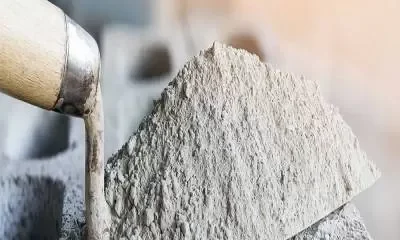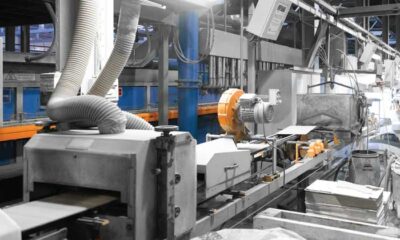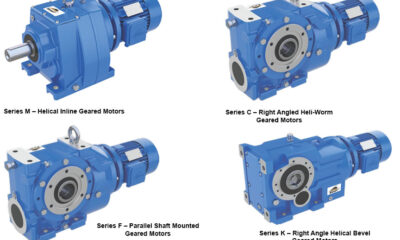Concrete
Typhoon air cannons unblock success in cement production
Published
1 year agoon
By
admin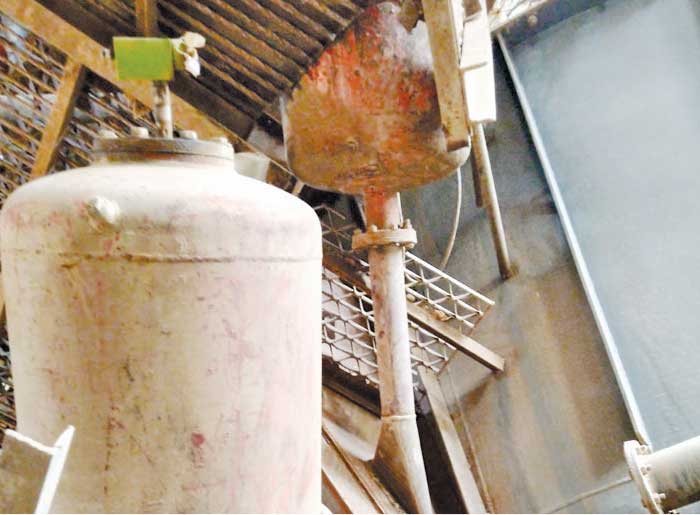
Saurashtra Cement resolved frequent chute jams at its Gujarat plant by installing Martin® Typhoon Air Cannons, which significantly reduced downtime, manual labour, and safety risks. The solution improved operational efficiency, lowered costs, and enhanced worker safety, transforming the plant’s performance.
Solution: Martin® Typhoon Air Cannons
Industry: Cement
Location: Saurashtra Cement, Ranavav, Porbandar, Gujarat, India
Problem: In the bustling Saurashtra Cement Ltd plant in Ranavav, Gujarat, a relentless challenge emerged: chute jams disrupting operations every 3 to 4 hours, requiring arduous manual cleaning. This routine not only erodes operational hours but also incurs unnecessary costs. The dedicated workforce found itself trapped in a cycle of labour-intensive manual cleaning, giving rise to numerous safety risks. The operational team needed a solution to address the continuous chute blockages.
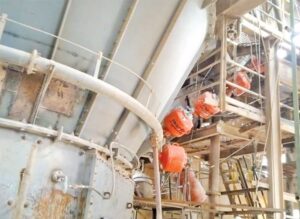
Air cannons prevent material build-up and minimise the need for manual cleaning.
Solution: The team at Saurashtra approached Martin’s expert team, who proposed a game-changing solution – an array of 10 Martin® Typhoon Air Cannons, each with a 70 litre capacity. Embracing this innovation, the plant management commissioned Martin to install Martin Typhoons to tackle the chute jamming challenge. The carefully timed compressed air bursts from these air cannons are designed to prevent material build-up and minimise the need for manual cleaning. This efficiency not only reduced downtime but also resulted in substantial cost savings and, most importantly improved health and safety for
the workforce.
Result: Implemented over the past year, the game-changing Martin® Air Cannons solution drastically reduced material buildups and blockages at the part of the plant. Manual interventions like poking and hammering are now relics of the past, replaced by the power of Martin’s innovation. The results exceeded expectations and in a short timespan the innovative Martin® Typhoon Air Cannons were a catalyst for a more efficient, cost-effective, and robust cement production process. Now the plant is seen as a beacon of efficiency and success, proving the transformative impact of the right solution.

Operational excellence in cement is no longer about producing more—it is about producing smarter, cleaner and more reliably, where cost per tonne meets carbon per tonne.
Operational excellence in cement has moved far beyond the old pursuit of ‘more tonne’. The new benchmark is smarter, cleaner, more reliable production—delivered with discipline across process, people and data. In an industry where energy can account for nearly 30 per cent of manufacturing cost, even marginal gains translate into meaningful value. As Dr SB Hegde, Professor, Jain College of Engineering & Technology, Hubli and Visiting Professor, Pennsylvania State University, USA, puts it, “Operational excellence… is no longer about producing more. It is about producing smarter, cleaner, more reliably, and more sustainably.” The shift is structural: carbon per tonne will increasingly matter as much as cost per tonne, and competitiveness will be defined by the ability to stabilise operations while steadily lowering emissions.
From control rooms to command centres
The modern cement plant is no longer a handful of loops watched by a few operators. Control rooms have evolved from a few hundred signals to thousands—today, up to 25,000 signals can compete for attention. Dr Rizwan Sabjan, Head – Global Sales and Proposals, Process Control and Optimization, Fuller Technologies, frames the core problem plainly: plants have added WHRS circuits, alternative fuels, higher line capacities and tighter quality expectations, but human attention remains finite. “It is very impossible for an operator to operate the plant with so many things being added,” he says. “We need somebody who can operate 24×7… without any tiredness, without any distraction… The software can do that for us better.”
This is where advanced process control shifts from ‘automation spend’ to a financial lever. Dr Hegde underlines the logic: “Automation is not a technology expense. It is a financial strategy.” In large kilns, a one per cent improvement is not incremental—it is compounding.
Stability is the new productivity
At the heart of operational excellence lies stability. Not because stability is comfortable, but because it is profitable—and increasingly, low-carbon. When setpoints drift and operators chase variability, costs hide in refractory damage, thermal shocks, stop-start losses and quality swings. Dr Sabjan argues that algorithmic control can absorb process disturbances faster than any operator, acting as ‘a co-pilot or an autopilot’, making changes ‘as quick as possible’ rather than waiting for manual intervention. The result is not just fuel saving—it is steadier operation that extends refractory life and reduces avoidable downtime.
The pay-off can be seen through the lens of variability: manual operation often amplifies swings, while closed-loop optimisation tightens control. As Dr Sabjan notes, “It’s not only about savings… there are many indirect benefits, like increasing the refractory life, because we are avoiding the thermal shocks.”
Quality control
If stability is the base, quality is the multiplier. A high-capacity plant can dispatch enormous volumes daily, and quality cannot be a periodic check—it must be continuous. Yet, as Dr Sabjan points out, the biggest error is not in analysis equipment but upstream: “80 per cent of the error is happening at the sampling level.” If sampling is inconsistent, even the best XRF and XRD become expensive spectators.
Automation closes the loop by standardising sample collection, transport, preparation, analysis and corrective action. “We do invest a lot of money on analytical equipment like XRD and XRF, but if it is not put on the closed loop then there’s no use of it,” he says, because results become person-dependent and slow.
Raju Ramachandran, Chief Manufacturing Officer (East), Nuvoco Vistas Corp, reinforces the operational impact from the plant floor: “There’s a stark difference in what a RoboLab does… ensuring that the consistent quality is there… starts right from the sample collection.” For him, automation is not about removing people; it is about making outcomes repeatable.
Human-centric automation
One of the biggest barriers to performance is not hardware—it is fear. Dr Sabjan describes a persistent concern that digital tools exist to replace operators. “That’s not the way,” he says. “The technology is here to help operator… not to replace them… but to complement them.” The plants that realise this early tend to sustain performance because adoption becomes collaborative rather than forced.
Dr Hegde adds an important caveat: tools can mislead without competence. “If you don’t have the knowledge about the data… this will mislead you… it is like… using ChatGPT… it may tell the garbage.” His point is not anti-technology; it is pro-capability. Operational excellence now requires multidisciplinary teams—process, chemistry, physics, automation and reliability—working as one.
GS Daga, Managing Director, SecMec Consultants, takes the argument further, warning that the technology curve can outpace human readiness: “Our technology movement AI will move fast, and our people will be lagging behind.” For him, the industry’s most urgent intervention is systematic skilling—paired with the environment to apply those skills. Without that, even high-end systems remain underutilised.
Digital energy management
Digital optimisation is no longer confined to pilots; its impact is increasingly quantifiable. Raghu Vokuda, Chief Digital Officer, JSW Cement, describes the outcomes in practical terms: reductions in specific power consumption ‘close to 3 per cent to 7 per cent’, improvements in process stability ‘10 per cent to 20 per cent’, and thermal energy reductions ‘2–5 per cent’. He also highlights value beyond the process line—demand optimisation through forecasting models can reduce peak charges, and optimisation of WHRS can deliver ‘1 per cent to 3 per cent’ efficiency gains.
What matters is the operating approach. Rather than patchwork point solutions, he advocates blueprinting a model digital plant across pillars—maintenance, quality, energy, process, people, safety and sustainability—and then scaling. The difference is governance: defined ownership of data, harmonised OT–IT integration, and dashboards designed for each decision layer—from shopfloor to plant head to network leadership.
Predictive maintenance
Reliability has become a boardroom priority because the cost of failure is blunt and immediate. Dr Hegde captures it crisply: “One day of kiln stoppage can cost several crores.” Predictive maintenance and condition monitoring change reliability from reaction to anticipation—provided plants invest in the right sensors and a holistic architecture.
Dr Sabjan stresses the need for ‘extra investment’ where existing instrumentation is insufficient—kiln shell monitoring, refractory monitoring and other critical measurements. The goal is early warning: “How to have those pre-warnings… where the failures are going to come… and then ensure that the plant availability is high, the downtime is low.”
Ramachandran adds that IoT sensors are increasingly enabling early intervention—temperature rise in bearings, vibration patterns, motor and gearbox signals—moving from prediction to prescription. The operational advantage is not only fewer failures, but planned shutdowns: “Once the shutdown is planned in advance… you have lesser… unpredictable downtimes… and overall… you gain on the productivity.”
Alternative fuels and raw materials
As decarbonisation tightens, AFR becomes central—but scaling it is not simply a procurement decision. Vimal Kumar Jain, Technical Director, Heidelberg Cement, frames AFR as a structured programme built on three foundations: strong pre-processing infrastructure, consistent AFR quality, and a stable pyro process. “Only with the fundamentals in place can AFR be scaled safely—without compromising clinker quality or production stability.”
He also flags a ground reality: India’s AFR streams are often seasonal and variable. “In one season to another season, there is major change… high variation in the quality,” he says, making preprocessing capacity and quality discipline mandatory.
Ramachandran argues the sector also needs ecosystem support: a framework for AFR preprocessing ‘hand-in-hand’ between government and private players, so fuels arrive in forms that can be used efficiently and consistently.
Design and execution discipline
Operational excellence is increasingly determined upstream—by the choices made in concept, layout, technology selection, operability and maintainability. Jain puts it unambiguously: “Long term performance is largely decided before the plant is commissioned.” A disciplined design avoids bottlenecks that are expensive to fix later; disciplined execution ensures safe, smooth start-up with fewer issues.
He highlights an often-missed factor: continuity between project and operations teams. “When knowledge transfer is strong and ownership carries beyond commissioning, the plant stabilises much faster… and lifecycle costs reduce significantly.”
What will define the next decade
Across the value chain, the future benchmark is clear: carbon intensity. “Carbon per ton will matter as much as cost per ton,” says Dr Hegde. Vokuda echoes it: the industry will shift from optimising cost per tonne to carbon per ton.
The pathway, however, is practical rather than idealistic—low-clinker and blended cements, higher thermal substitution, renewable power integration, WHRS scaling and tighter energy efficiency. Jain argues for policy realism: if blended cement can meet quality, why it shall not be allowed more widely, particularly in government projects, and why supplementary materials cannot be used more ambitiously where performance is proven.
At the same time, the sector must prepare for CCUS without waiting for it. Jain calls for CCUS readiness—designing plants so capture can be added later without disruptive retrofits—while acknowledging that large-scale rollout may take time as costs remain high.
Ultimately, operational excellence will belong to plants that integrate—not isolate—the levers: process stability, quality automation, structured AFR, predictive reliability, disciplined execution, secure digitalisation and continuous learning. As Dr Sabjan notes, success will not come from one department owning the change: “Everybody has to own it… then only… the results could be wonderful.”
And as Daga reminds the industry, the future will reward those who keep their feet on the ground while adopting the new: “I don’t buy technology for the sake of technology. It has to make a commercial sense.” In the next decade, that commercial sense will be written in two numbers—cost per tonne and carbon per tonne—delivered through stable, skilled and digitally disciplined operations.
Concrete
World Cement Association Annual Conference 2026 in Bangkok
Global leaders to focus on decarbonisation and digitisation
Published
3 days agoon
March 2, 2026By
admin
The World Cement Association (WCA) will host its 2026 Annual Conference from 19–21 April 2026 at The Athenee Hotel in Bangkok, Thailand. The two-day programme will convene global cement industry leaders, policymakers, technology providers and stakeholders to examine strategic, operational and sustainability challenges shaping the sector’s next phase of transformation. The conference theme of shaping a sustainable future through digitisation, innovation and performance will frame sessions and networking opportunities across the event.\n\nThe programme will open with a comprehensive assessment of the global economic environment and its impact on cement markets, alongside regional outlooks across Asia and Europe. Speakers will address regulatory developments including carbon border adjustment mechanisms (CBAM) in Europe, progress in China’s carbon trading system and market dynamics in Thailand and South East Asia, and will outline practical decarbonisation pathways such as alternative fuels, next-generation supplementary cementitious materials (SCMs) and calcined clay developments. Sessions will also examine AI-enabled kiln optimisation and other digital approaches to improve plant performance.\n\nDay two will focus on overcapacity challenges and industry restructuring, using case studies and regional perspectives to provide delegates with practical insights into unlocking performance while accelerating decarbonisation. Discussions will explore digital maturity and AI-driven plant operations, manufacturing optimisation, sustainable building solutions and circular concrete models, together with evolving customer requirements across the construction value chain. The event will include the WCA Awards Ceremony at the Awards Gala Dinner on 20 April to recognise excellence in sustainability, innovation, safety and leadership.\n\nPhilippe Richart, chief executive officer of the WCA, said the sector was navigating a period of profound transformation, from managing overcapacity and market volatility to deploying AI and delivering measurable decarbonisation, and that the Annual Conference would bring global leaders together to exchange practical solutions and strengthen collaboration. Registration is open and tickets include admission to the two-day event, all sessions, refreshments and lunch, exhibition access and the Awards Gala Dinner. Further information on the programme is available via the WCA Annual Conference 2026 event page and queries on sponsorship or exhibition may be directed to events@worldcementassociation.org.
Concrete
Assam Chief Minister Opens Star Cement Plant In Cachar
New plant aims to boost local industry and supply chains
Published
3 days agoon
March 2, 2026By
admin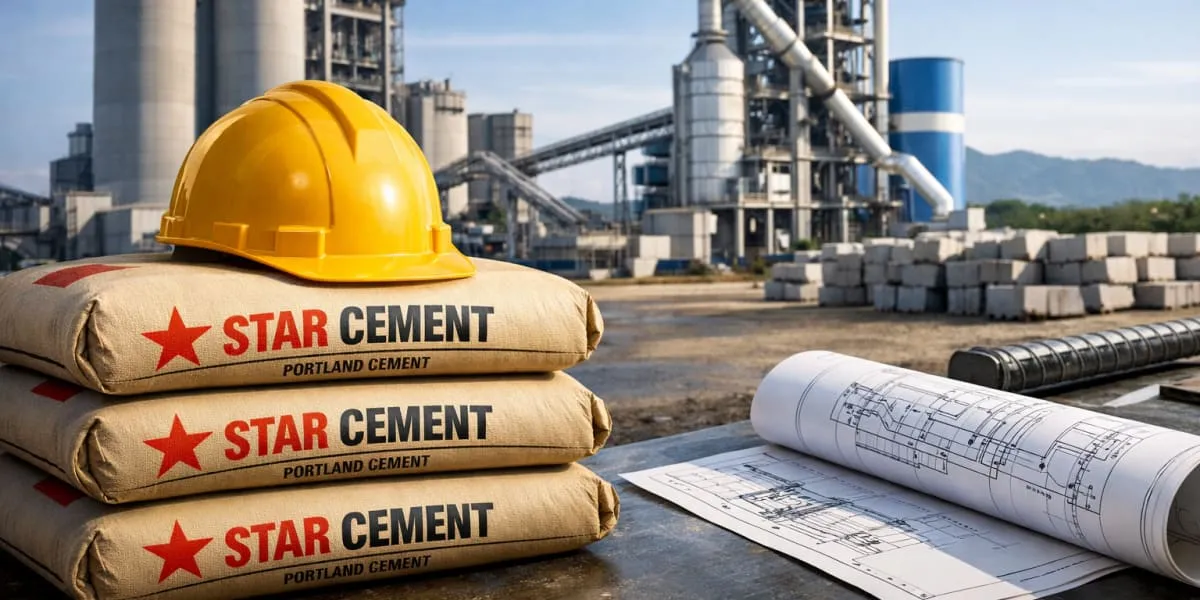
Chief Minister Himanta Biswa Sarma inaugurated the Star Cement plant in Cachar on 28 February 2026, marking the opening of a manufacturing facility designed to serve the region. The event was attended by state officials and company representatives, and it was reported with inputs from ANI. The plant is positioned as a strategic addition to the industrial landscape of southern Assam and is expected to improve the availability of construction materials for local projects.
The establishment is expected to generate employment opportunities and to stimulate ancillary businesses in the supply chain, including transport and local vendors. State officials indicated that the plant will enhance logistical efficiency by reducing the need to transport cement over long distances, which may lower construction costs for public and private projects. Observers said the presence of a regional cement facility can support housing and infrastructure initiatives that are underway or planned.
Government representatives reiterated that the state seeks to attract responsible investment that complements regional priorities and that the administration will continue to facilitate infrastructure and connectivity to support industrial operations. The inauguration was presented as consistent with broader efforts to diversify the industrial base in the northeast and to create an enabling environment for small and medium enterprises that supply goods and services to larger manufacturers.
Company sources and the state leadership underlined the importance of maintaining environmental safeguards while pursuing industrial growth, and they signalled that compliance with applicable norms will be a priority at the new facility. The announcement was framed as a step towards balanced development that links job creation, regional supply chains and local economic resilience. The report was prepared by the TNM Bureau with inputs from ANI.

Operational Excellence Redefined!

World Cement Association Annual Conference 2026 in Bangkok

Assam Chief Minister Opens Star Cement Plant In Cachar

Adani Cement, NAREDCO Form Strategic Alliance

Walplast’s GypEx Range Secures GreenPro Certification

Operational Excellence Redefined!

World Cement Association Annual Conference 2026 in Bangkok

Assam Chief Minister Opens Star Cement Plant In Cachar

Adani Cement, NAREDCO Form Strategic Alliance




